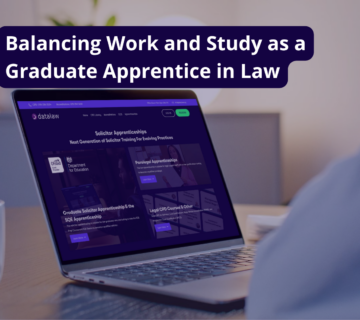The Level 7 Solicitor Apprenticeship offered by Datalaw is an intensive and competitive program that spans six years. It is primarily aimed at individuals who have completed their A-levels, paralegals, chartered legal executives, and those seeking a career change to become solicitors. The program blends in-depth legal training with practical experience, equipping apprentices with both theoretical knowledge and hands-on skills necessary for legal cases. In this article we will be discussing the most efficient solicitor apprenticeship application tips to help those that are looking to apply.
Key Components of the Apprenticeship
- Curriculum: The apprenticeship encompasses a wide range of legal subjects. In the first year, apprentices study Common Law Method and Ethics, Public Law, and the Law of Contract. Subsequent years cover topics like Law of Tort, Criminal Law, Land Law, Real Estate, Business Law, Equity and Trusts, Criminal Litigation and Evidence, and Civil Dispute Resolution. The final year focuses on SQE preparation and examination, as well as key practice areas for an LLM.
- Qualifying Examination: The apprenticeship prepares candidates for the Solicitors Qualifying Examination (SQE), which is a requirement to become a qualified solicitor. Apprentices are eligible to take Parts 1 and 2 of the SQE after completing the program.
- Learning Process: The program offers online support and courses, including monthly one-on-one meetings. Apprentices have access to online modules and quizzes, which are designed to build a solid foundation in various legal subjects.
- Assessment: Towards the end of the apprenticeship, candidates undergo an end-point assessment which includes written exams and a Skype interview with an assessor. This stage is critical for demonstrating the comprehensive legal knowledge and skills acquired during the apprenticeship.
Funding and Costs
- Cost: The total cost of the qualification is £27,000. If co-funded, the firm pays a 5% contribution, amounting to £1350 + VAT, while the remainder is funded by the ESFA.
- Funding: The apprenticeship is supported by government funding through the apprenticeship levy, which is available to all law firms in England. Datalaw, as a registered provider, can leverage this funding to subsidise the cost of the qualification on behalf of a firm.
Application Tips
Considering the competitiveness and rigour of the Level 7 Solicitor Apprenticeship, here are some tips for potential candidates:
- Express Genuine Interest: Clearly articulate your motivation for choosing this particular apprenticeship. Explain how it aligns with your career goals and why it appeals to you more than other routes into the legal profession.
- Demonstrate Commitment: Given the duration and depth of the program, showing a long-term commitment to the legal profession is crucial. Highlight any relevant experiences or accomplishments that demonstrate your dedication to pursuing a career in law.
- Prepare for the Assessment Day: Familiarise yourself with the structure and content of the SQE. Engage in preparatory courses or study groups if possible. Demonstrating a solid understanding of what the SQE entails will show your readiness for the apprenticeship.
- Showcase Relevant Skills and Experience: If you have any legal experience or have engaged in activities that have honed skills relevant to a legal career, make sure to highlight these in your application. This could include analytical thinking, attention to detail, or effective communication skills.
- Understand the Apprenticeship Structure: Be aware of the modules included in the apprenticeship and how they contribute to your development as a solicitor. This knowledge will not only help in the application process but also ensure you are well-prepared for what lies ahead.
By following these application tips for the solicitor apprenticeship and demonstrating a clear understanding of what the Level 7 Solicitor Apprenticeship entails, candidates can enhance their chances of success in this competitive field.



